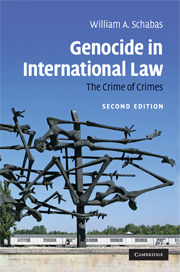Book contents
- Frontmatter
- Contents
- Preface to the first edition
- Preface to the second edition
- Acknowledgments
- List of abbreviations
- Introduction
- 1 Origins of the legal prohibition of genocide
- 2 Drafting of the Convention and subsequent normative developments
- 3 Groups protected by the Convention
- 4 The physical element or actus reus of genocide
- 5 The mental element or mens rea of genocide
- 6 ‘Other acts’ of genocide
- 7 Defences to genocide
- 8 Prosecution of genocide by international and domestic tribunals
- 9 State responsibility and the role of the International Court of Justice
- 10 Prevention of genocide
- 11 Treaty law questions and the Convention
- Conclusions
- Appendix: The three principal drafts of the Convention
- Bibliography
- Index
11 - Treaty law questions and the Convention
Published online by Cambridge University Press: 07 July 2009
- Frontmatter
- Contents
- Preface to the first edition
- Preface to the second edition
- Acknowledgments
- List of abbreviations
- Introduction
- 1 Origins of the legal prohibition of genocide
- 2 Drafting of the Convention and subsequent normative developments
- 3 Groups protected by the Convention
- 4 The physical element or actus reus of genocide
- 5 The mental element or mens rea of genocide
- 6 ‘Other acts’ of genocide
- 7 Defences to genocide
- 8 Prosecution of genocide by international and domestic tribunals
- 9 State responsibility and the role of the International Court of Justice
- 10 Prevention of genocide
- 11 Treaty law questions and the Convention
- Conclusions
- Appendix: The three principal drafts of the Convention
- Bibliography
- Index
Summary
Articles X to XIX of the Genocide Convention are protocolar clauses. They address such issues as the authentic language versions of the Convention, the procedures for signature, ratification and accession, denunciation and amendment. These questions, while secondary to the Convention as a whole, were considered at all stages of the drafting. Work on this subject was largely conducted by a three-member sub-committee of the Ad Hoc Committee, whose conclusions received perfunctory approval by the plenary Committee and were subsequently endorsed by the Sixth Committee. Most of these protocolar clauses are deemed to take effect from the date of adoption of the Convention, and not from the date of entry into force of the Convention, in accordance with article 24(4) of the Vienna Convention on the Law of Treaties: ‘The provisions of a treaty regulating the authentication of its text, the establishment of the consent of States to be bound by the treaty, the manner or date of its entry into force, reservations, the functions of the depositary and other matters arising necessarily before the entry into force of the treaty apply from the time of the adoption of its text.’
Languages of the Convention
There are five authentic versions of the Convention: Chinese, English, French, Russian and Spanish. Article XI says that all of the texts are equally authentic. A Secretariat draft provision dealt with the subject but did not specify the languages.
- Type
- Chapter
- Information
- Genocide in International LawThe Crime of Crimes, pp. 593 - 640Publisher: Cambridge University PressPrint publication year: 2009



